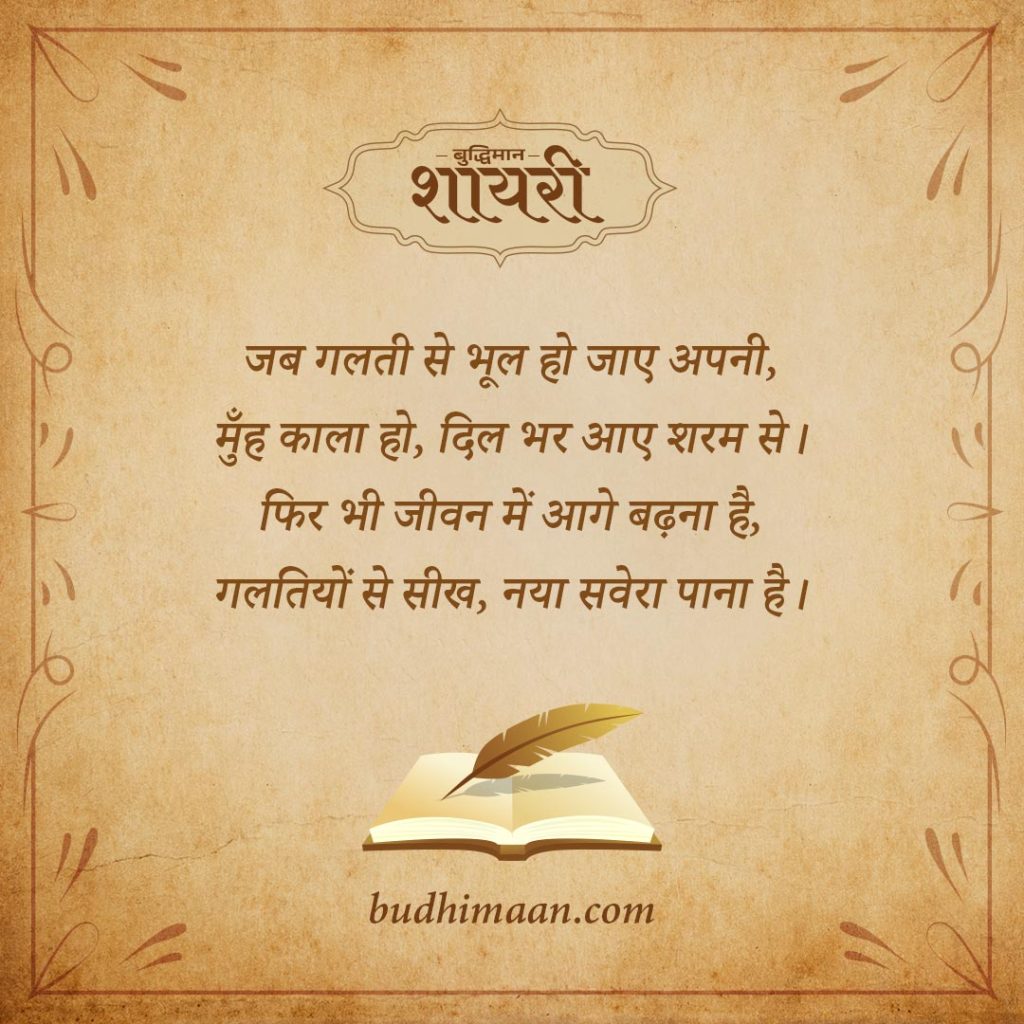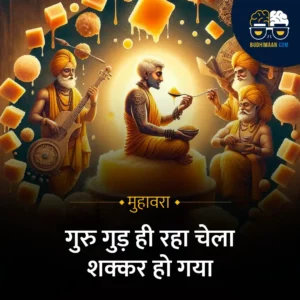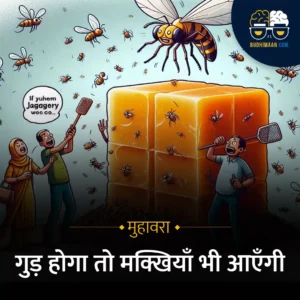अर्थ: “मुँह काला करना” यह मुहावरा तब इस्तेमाल होता है जब किसी का बिना वजह अपमान किया जाए। इस मुहावरे का अर्थ है किसी की बेज्जत करना या उसे शरमसार करना।
प्रयोग: जब किसी को उसकी गलती के चलते बेइज्जती हो, या जब कोई अपनी गलती को मानता है और उससे शरम महसूस होती है, तो ‘मुँह काला करना’ मुहावरे का प्रयोग होता है।
उदाहरण: राम ने सभा में अपनी गलती को स्वीकारते हुए कहा, “मैंने अपना मुँह काला कर लिया है।”
विशेष टिप्पणी: इस मुहावरे का प्रयोग व्यक्ति की बेइज्जती या उसकी गलती को दर्शाने के लिए होता है, जिससे वह शरमसार होता है। यह मुहावरा हमें यह भी सिखाता है कि हमें अपनी गलतियों से सीखना चाहिए और उन्हें दोहराने से बचना चाहिए।

मुँह काला करना मुहावरा पर कहानी:
मोहन गाँव का सबसे बड़ा व्यापारी था। उसकी दुकानें गाँव के हर कोने में थीं और लोग उसे बहुत सम्मान देते थे। एक दिन, गाँव में मेला लगा और मोहन ने सोचा कि वह अपने व्यापार को और बढ़ाने के लिए मेले में एक बड़ा स्टॉल लगाएगा।
मोहन ने अपने स्टॉल पर बहुत सारी चीजें रखी और उम्मीद की कि लोग उससे बहुत सारी खरीददारी करेंगे। लेकिन उसने एक बड़ी गलती की। उसने अपने स्टॉल के सामने एक बड़ा पोस्टर लगाया जिस पर था, “सबसे सस्ती दाम में सामान!” लेकिन जब लोग उसके स्टॉल पर गए तो उन्होंने देखा कि वहाँ के मूल्य बाकी स्टॉल्स से ज्यादा थे।
लोग मोहन पर गुस्सा हुए और उसे धोखेबाज़ कहकर चले गए। मोहन को समझ में आया कि उसने अपना ‘मुँह काला’ कर लिया है। उसने अपनी गलती मानी और लोगों से माफी मांगी। वह समझ गया कि सिर्फ व्यापार बढ़ाने के लिए गलत जानकारी देना सही नहीं है।
शायरी:
जब गलती से भूल हो जाए अपनी,
मुँह काला हो, दिल भर आए शरम से।
फिर भी जीवन में आगे बढ़ना है,
गलतियों से सीख, नया सवेरा पाना है।

आशा है कि आपको इस मुहावरे की समझ आ गई होगी और आप इसका सही प्रयोग कर पाएंगे।
Hindi to English Translation of मुँह काला करना – Muh kala karna Idiom:
Meaning: The literal translation of “Muh kala karna” is “to blacken one’s face”, but its idiomatic meaning is to disgrace someone or to make someone feel ashamed.
Usage: This idiom is used when someone feels humiliated due to their mistake, or when someone acknowledges their error and feels embarrassed about it.
Example:
In a meeting, Ram admitted his mistake and said, “I have disgraced myself (literal translation: Muh kala karna).”
This idiom is employed to highlight a person’s humiliation or their error, making them feel remorseful. It also teaches us that we should learn from our mistakes and avoid repeating them.
Story of Muh kala karna idiom in English:
Mohan was the biggest trader in the village. He had shops in every corner of the village, and people respected him a lot. One day, a fair was organized in the village, and Mohan thought of setting up a large stall in the fair to expand his business.
Mohan displayed many items on his stall, hoping that people would buy a lot from him. But he made a big mistake. He put up a large poster in front of his stall that read, “Goods at the Cheapest Price!” However, when people visited his stall, they found that the prices were higher than the other stalls.
People got angry at Mohan and left, calling him a cheat. Mohan realized that he had “tarnished his reputation” (literal translation: “blackened his face”). He admitted his mistake and apologized to the people. He understood that giving false information just to boost business is not right.
I hope this gives you a clear understanding of the proverb and how to use it correctly
FAQs:
क्या “मुँह काला करना” मुहावरे का प्रयोग सकारात्मक संदर्भ में होता है?
नहीं, यह मुहावरा आमतौर पर नकारात्मक संदर्भ में प्रयोग होता है।
क्या इस मुहावरे का प्रयोग व्यक्तिगत संदर्भ में भी होता है?
हाँ, इसका प्रयोग व्यक्तिगत संदर्भ में हो सकता है, जैसे जब कोई व्यक्ति अपनी ही गलतियों के कारण शर्मिंदा हो।
क्या “मुँह काला करना” का प्रयोग केवल मानव संदर्भ में होता है?
आमतौर पर, इस मुहावरे का प्रयोग मानव संदर्भ में ही होता है, जैसे किसी के आचरण या कार्यों के संबंध में।
क्या “मुँह काला करना” का प्रयोग औपचारिक लेखन में होता है?
यह मुहावरा ज्यादातर अनौपचारिक या बोलचाल की भाषा में प्रयोग होता है, लेकिन कुछ साहित्यिक कृतियों में इसका प्रयोग हो सकता है।
“मुँह काला करना” मुहावरे का प्रयोग साहित्य में कैसे होता है?
साहित्य में, यह मुहावरा अक्सर उन पात्रों के संदर्भ में प्रयोग होता है जो अपने कर्मों के कारण लज्जित या कलंकित होते हैं।
हिंदी मुहावरों की पूरी लिस्ट एक साथ देखने के लिए यहाँ क्लिक करें
यह मुहावरा मानव शरीर के अंगों पर आधारित मुहावरे पेज पर भी उपलब्ध है।









1 टिप्पणी